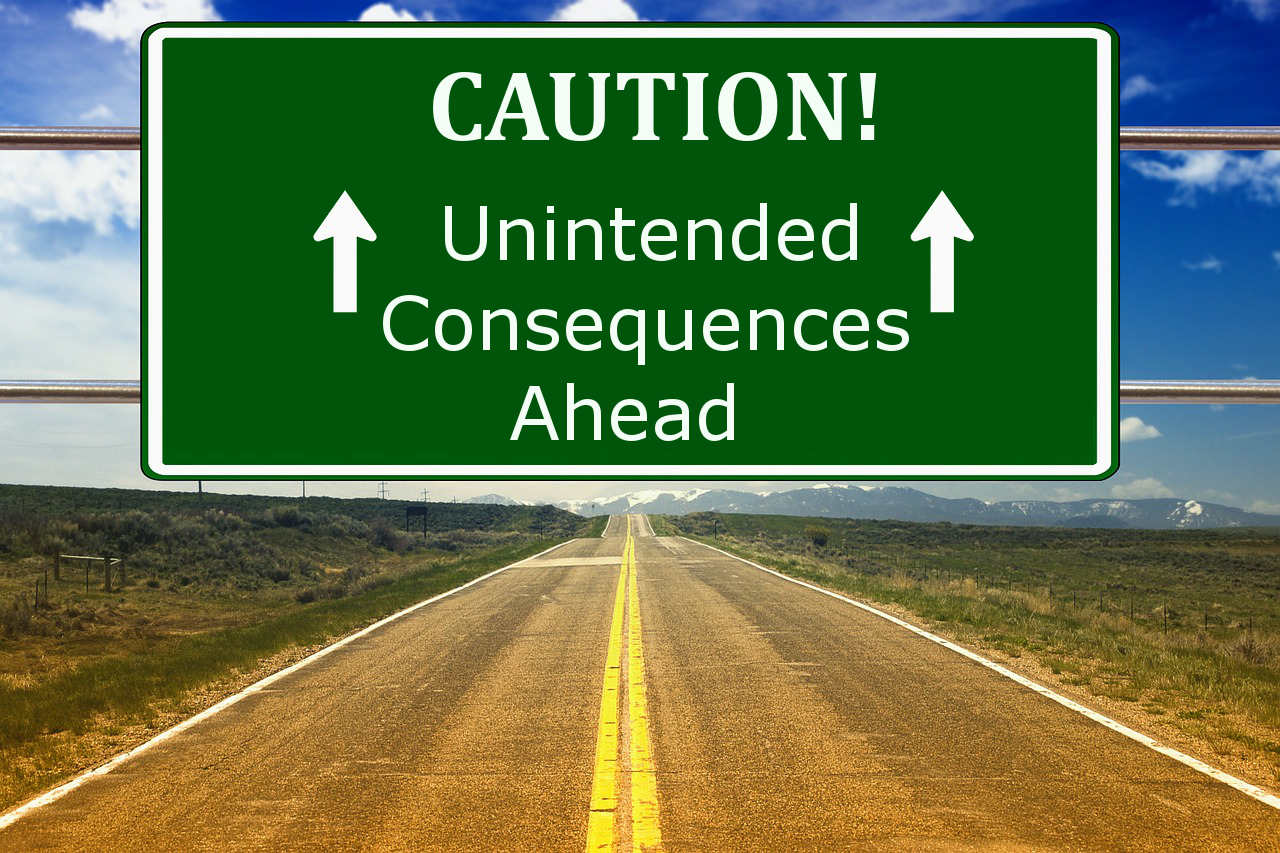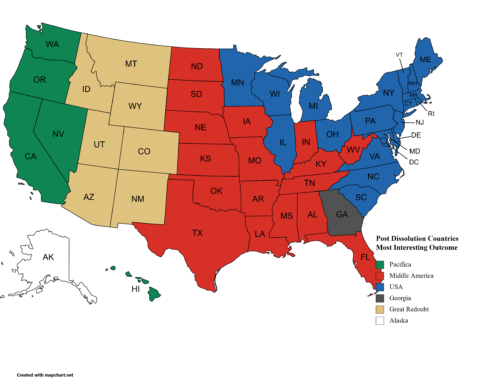One of the truths of all human endeavor, especially in business, is that your actions have consequences. That is, after all, why we make decisions and think about what we need to do to achieve our desired outcomes. And when we do it properly, we are rewarded with success. But what happens when we take certain actions and something other than our expected outcome occurs? Were we just unlucky? Was someone nefariously undermining our success? Or could it be that we were so focused on what we wanted to happen that we didn’t think about what was more likely to happen?
Nobody sets out to lose a bunch of money or make bad business decisions that threaten to undermine the operations. However, all evidence in any industry, the government or segment of the economy show that despite their best intentions, people responsible for planning do not consider all the likely implications of the actions they take to achieve a specific outcome.
Today’s Washington Post has several examples of unintended, but very predictable consequences of planning decisions.
Griff Witte writes about the consequences of decades of incentives in Europe to reduce carbon dioxide by pushing people and communities to turn to “cleaner” diesel rather than gasoline. “It’s a complete policy failure,” said Gary Fuller, who directs an air-quality-study center at King’s College London. “No one could defend this.” In an attempt to clean up the air and “save the planet”, instead “With nearly 10,000 Londoners dying early every year due to air pollution, tackling poor air quality is a public health emergency,” says London’s mayor. You see, the move to diesel has, indeed, lowered carbon dioxide emissions, but it has significantly increased nitrogen dioxide, a deadly gas that doesn’t harm the environment as much as it kills people. The EU’s push to clean up the air results in this entirely predictable outcome: “In particularly traffic-swollen areas of central London, it took just the first eight days of 2016 to breach the European Union’s NO2 limits for the entire year.”
Joby Warrick writes of the attack on the Christmas Market in Berlin: “already it appeared that the attack had achieved one of the Islamic State’s stated objectives: spreading fear and chaos in a Western country in hopes of sharpening the divide between Muslims and everyone else.” It is difficult to believe that the government planners who opened borders for refugees would be surprised when such incidents occur. They are entirely foreseeable and should be expected. That doesn’t mean the policies should have been different, but just that the officials should not have been surprised. After all, each of the countries of Europe recognized that while there are commonalities between them that make them “European” each country is proud of its own cultural and historical uniqueness which sets it apart from the rest. If not, why have separate countries. When opening the doors to waves of people who share so little of what makes you who you are, it is unreasonable to expect that at some tipping point, you will cease to be who you always have been. Just type the words “Sweden identity crisis following migrant crime wave” and read the deep crisis of identity Sweden is undergoing after being surprised when decades of migrants didn’t embrace their new country and its culture and customs, but instead turned once peaceful streets into crime zones. Should this have been foreseeable? I contend yes, and easily at that.
Finally, Steven Overly writes about the millions of jobs that will be lost as artificial intelligence really takes hold in the business world. We have been promised for decades, and are told in this article once again, that as AI becomes the norm, people will spend less time at work leaving more time to enjoy life. But where in this claim is the truth that people who work less make less money and people whose jobs are taken by AI have no money. And thus with less or no money, how can people improve their quality of life? The article states that those whose skills “involve a high degree of creativity, analytical thinking or interpersonal communication are considered most secure.” that sounds like upper management and the entrepreneurial class who are most likely to transition their businesses to AI wherever possible to save money and increase productivity through high quality and inexpensive standardization. Entirely foreseeable is the fact that as technology makes jobs simpler, people will not have to work as many hours in many fields of labor. But also entirely foreseeable is the fact that as people work less or lose their jobs they don’t have money to spend.
What about in your businesses? The same thought process applies. Real examples in business abound. Does anyone remember Zima, the clear beer? Yup, that went over great, didn’t it. Someone at Coors brewing had the idea in 1992 to piggyback on the “clear is clean” rage that was making its way through industry from soaps and cleaning materials to Pepsi. Clear beer. Everyone would want it. Nope.
I’ve had clients that were tops in their industry segment who had a great idea to expand into another product line outside their core under the assumption that “everyone would want in on that.” When I ask about where the data comes from, I’m told, “Heck, I’d want to buy that and people I know certainly would.” When I politely try to say that I doubt whether most people within their own industry would want to spend money on that, let alone people in the general public, they laugh me off. But consecutive years of failures still don’t teach some people to think about the natural consequences of their decisions.
Here’s another. The hard working CEO who built his company from nothing to the top of his industry sells it. Then the firm tanks and he buys it back, and through his hard rescue work, gets it back on top. He’s now ready to hand it over to his kids and travel the world. I ask if he would be comfortable if the kids, once the business is theirs, take the company in a totally different direction after he retires. He stares at me in shock and asks why they’d do such a thing. I say that I don’t necessarily think they will, but I’m only asking if he would still leave it to them if he thought they might take the business in a different direction than he’d want. He says he’d be fine with that. Then he immediately gets uncomfortable and changes his mind to say he’d stew over it the rest of his life.
The last two examples are small business instances of the major government examples above. Namely clearly foreseeable implications of planning decisions that were based on hope, rather than validated assumptions.
So what do you do? First of all, be honest. Remember that truth isn’t good or bad. It just is. So if you look at your desired outcome, you should really try to think of all the potential outcomes your actions can result in. And it may be that you do achieve your outcome, but at the cost of other concurrent outcomes. For example, European countries succeeded in offering millions of refugees an alternative to war over the last 2 decades. That is an objective good. But they should have weighed that good against the foreseeable cultural stress on their countries. Had they done so, they could have made an informed decision as to whether the good was worth the societal stress, and if so, they could have prepared differently than they did instead of hoping all would be well.
Likewise, if you are a solid business that is looking at potential gains by expanding into another segment outside your primary business line, you ought to ask how much you are willing to lose and then not be upset if that happens. On the other hand, you might spend some percentage of the money you are willing to put up for loss in order to do some analysis of whether this is a wise decision. You might decide that spending $20k on a study that convinces you your venture would lose money is worth the $200k you might otherwise lose.
You might really want to keep word from getting out about something you are planning to release in the coming months or years. To keep that work secret, you must foresee some amount of inefficiency and potentially social consequences within your company today as well as integration costs down the road. You have to weigh how much you want to keep the secret and if it is worth the foreseeable costs. But what you ought not do is pretend that you can keep the new product or upgrade secret without any costs today or down the road. That isn’t honest and it makes your business suffer down the line.
Hope is not a plan. Planning takes some hard work and it takes being open to evidence and truth. It takes considering what will most certainly happen and what will likely happen, not just what you hope will happen when you take specific actions.
So at the end of this calendar year and beginning of the next, lets resolve to keep truth foremost in our minds and try to limit surprise in our lives, businesses and countries.
Peace be with you all.
Keep thinking…






Leave A Comment